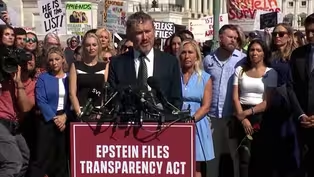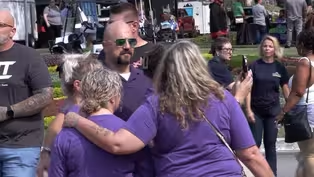
Following Up on "Science of Reading"
Clip: Season 4 Episode 51 | 4m 26sVideo has Closed Captions
A progress report from a school district on a successful way they're teaching kids to read.
Two years ago, KET visited Hancock County Schools to learn more about their success with the Science of Reading. We followed up with them recently to see how they're building on that progress. More of their teachers are now structured literacy specialists. Laura Rogers takes us to western Kentucky.
Problems playing video? | Closed Captioning Feedback
Problems playing video? | Closed Captioning Feedback
Kentucky Edition is a local public television program presented by KET

Following Up on "Science of Reading"
Clip: Season 4 Episode 51 | 4m 26sVideo has Closed Captions
Two years ago, KET visited Hancock County Schools to learn more about their success with the Science of Reading. We followed up with them recently to see how they're building on that progress. More of their teachers are now structured literacy specialists. Laura Rogers takes us to western Kentucky.
Problems playing video? | Closed Captioning Feedback
How to Watch Kentucky Edition
Kentucky Edition is available to stream on pbs.org and the free PBS App, available on iPhone, Apple TV, Android TV, Android smartphones, Amazon Fire TV, Amazon Fire Tablet, Roku, Samsung Smart TV, and Vizio.
Providing Support for PBS.org
Learn Moreabout PBS online sponsorshipTwo years ago, KATU visited Hancock County Schools to learn more about their success with the science of reading.
We followed up with them recently to see how they're building on that progress.
More of their teachers are now structured literacy specialists.
Our Laura Rogers takes us to Western Kentucky to find out more.
This is best practice for kids.
This is how they're going to learn to read that practice.
As Orton Gillingham and the Science of Reading, now in its fourth year at Hancock County Schools, it's really giving teachers some tangible concepts.
The district turned to this method to raise low reading scores they saw during the pandemic.
But numbers, you know, they just kept dropping and that wasn't acceptable.
That's not good enough.
You can't let kids keep going from one grade level to the next grade level and not being able to read.
We knew we had to do something to catch those kids up.
Not only have kids caught up, they're now exceeding expectations.
Now we've gotten so methodical about how we're teaching, and it's so sequential that you don't see all those holes.
It's everybody's getting everything they need.
Holly Pate, the mother of four children, agrees decades of neuroscience research that's implemented into classroom practice.
As a nurse and graduate student, she's excited and encouraged by that research, calling it a blanket language that works for all students.
The ability to apply or Gillingham to my student who does not experience the dyslexia challenges, and my student who does experience with dyslexia challenges.
And that standard language in our home allows us to enjoy reading more.
Took part in an Orton Gillingham parent training this summer in partnership with the local public library.
Same day I went home and pulled out some words from last year for my first grader, and I pulled these out and I implemented some of the the mechanics and how they taught parents how to assist in school learning at home.
And he got it instantly.
It's been able to give them the tools that they need to be able to be good spellers and good writers.
When test scores indicated gains in literacy, but still some challenges with vocabulary, educators implemented morphology and grades two through ten.
Morphology is where you're breaking apart different words into prefixes and suffixes and root words.
They just have access to a lot more vocabulary words, deeper comprehension and understanding of text.
Teachers say the district's collective approach across all schools and subjects makes them meet the successful.
There we go.
Having that science of reading background and having that professional development through KDE, and we've really all shared the same vocabulary.
We all talk about reading in the same ways, right?
We all have a certain sequence that we're following.
We all use the same routines.
First grade teacher Betty Jane Mitchell had previously only taught math, science, and social studies.
I was kind of scared of teaching reading, but then she was trained in both Orton Gillingham and Letters Language Essentials for Teachers of Reading and Spelling.
It was the first time that I felt like I could actually teach a kid to read, and I could successfully do it.
Heather Bold says her training gave the same confidence.
My eyes just gleamed like I soaked everything in like a sponge.
I wanted to grab a kid and teach them how to read.
She teaches reading and math at the middle school, specializing this year in reading intervention.
I can't tell you how beneficial this has been to middle school kids where yes, they know they struggle, but they know that they're getting the help that they need.
Teachers get the help they need.
Two with a system for support and continued learning.
We keep growing the sustainability, the leadership that's going to keep helping our teachers.
It's actually asked that in my interview, and I was very honest and tell them, I don't know a lot about the science of reading, but would love to learn.
And they definitely did that for me.
Hannah Maddox believes the success lies in the multi-sensory approach.
They're not just hearing it, they're not just saying it.
They're not just reading it.
It's like a mixture of everything in one.
With more than 30 years in education, Bryanna Pulliam just wishes it had come sooner.
We didn't have this training many years ago.
I wish we would have because it is that life changing without going to say for good.
I'm Laura Rogers.
Massie Predicts Vote on Epstein Files
Video has Closed Captions
Clip: S4 Ep51 | 2m 10s | Congressman Thomas Massie believes the House will vote for the release of the Epstein files. (2m 10s)
Rand Paul Acknowledges Concerns Over Tariffs, Deficit
Video has Closed Captions
Clip: S4 Ep51 | 2m 12s | Senator Rand Paul talks about government spending and a potential run for the White House. (2m 12s)
Recovery Rally Held in Frankfort
Video has Closed Captions
Clip: S4 Ep51 | 3m 59s | Supporters and survivors of substance abuse gather in Frankfort. (3m 59s)
Providing Support for PBS.org
Learn Moreabout PBS online sponsorship
- News and Public Affairs

Top journalists deliver compelling original analysis of the hour's headlines.

- News and Public Affairs

FRONTLINE is investigative journalism that questions, explains and changes our world.












Support for PBS provided by:
Kentucky Edition is a local public television program presented by KET


